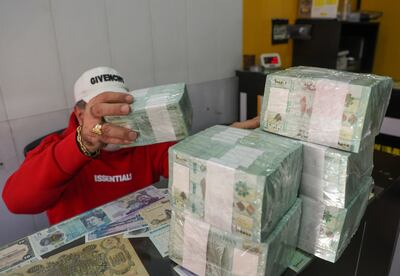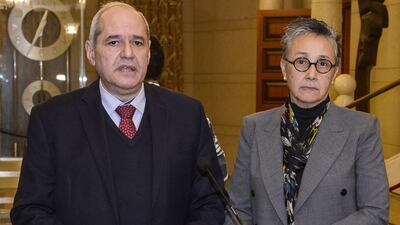Several weeks ago, I wrote an article outlining a radical proposal Ralph Nader and I put forward for discussion. The proposal called on Lebanon’s civil society to petition the UN to declare Lebanon a “failed state” requiring international intervention. Many readers commented favourably on the idea, also registering their frustration with Lebanon’s corruption and dysfunction. Others noted that, although the idea was worth considering, they believed that it would never pass the Security Council. The point of the proposal, however, was not to present a fait accompli. Rather, it was to spur exactly the type of discussion that ensued.
What’s clear is that Lebanon is broken, and its people are suffering. Its governing institutions aren’t functioning, and its traditional leadership appears incapable of meeting the challenges confronting the country. Evidence of this dysfunction is the fact that for the past four months Lebanon’s Parliament has been unable to elect a president.
In the face of this paralysis, we have witnessed a courageous and important step being taken by a group of newly elected members of the Lebanese Parliament, who have been conducting a protest sit-in, now in its fourth week, at Beirut’s Parliament building. Led by two of the independent “Forces of Change” group of newly electeds, Najat Saliba and Melhem Khalaf, the protesters are calling on their colleagues to convene and fulfil their responsibility to elect a president so that at least a semblance of a functioning government can be formed.
It is important to acknowledge that seating a president and a cabinet is at best a short-term fix that will not solve Lebanon’s multi-layered crises. At the same time, it’s important to support the MPs’ decision to sit-in precisely because their action shines a light on the dysfunctional mess created by the sectarian cliques controlling the Parliament. By focusing on their petty agendas instead of the national interests, the sectarian elites in power have led the country to ruin.
In a letter appealing for support, MPs Saliba and Khalaf listed some of the unaddressed hardships confronting the Lebanese people, noting, in particular, those brought on by the country’s economic collapse. Given the steady erosion of the value of Lebanese currency, Lebanon’s average monthly income has plummeted from $450 to $10. As a result, almost 75 per cent of the population lives in poverty. Three hundred thousand children are left without schools. Patients with serious illnesses are left without medical care or essential medications. And most damning, they write, “Cholera is spreading, 90 per cent of the water supply is polluted and over one million families cannot afford fuel”. This nightmare is the reality in the country whose capital was once heralded as the “Paris of the Middle East”.
Their action shines a light on the dysfunctional mess created by the sectarian cliques controlling the Parliament
In the face of this catastrophic situation and governing vacuum, the Lebanese Parliament has met 11 times since October and each time failed to fulfil its basic constitutional duty to elect a president. Each of these sessions, as MPs Saliba and Khalaf have noted, has turned “the presidential election into a theatrical comedy”. There has been no serious voting, followed by adjournment. During each of the 11 meetings, some Members of Parliament have approached their responsibility seriously and have simply disagreed on the right candidate to support. Others have been purely obstructionist, seeing paralysis as better than electing a president who will not protect their partisan group’s corrupt control over ministries and budgets.
As a result of this inaction and/or obstruction, Lebanon has not had a functioning government for almost four months. Without a president, there is no cabinet; ministries of government aren’t able to implement policies; and the Parliament can’t pass laws or enact reforms. There is no authority that can negotiate with international institutions for loans or grants with which to provide needed revenues and services. And Members of Parliament cannot enact reforms to protect basic rights, address income inequality, ensure accountability for crimes committed against the Lebanese people or challenge and expose endemic corruption that is at the heart of the Lebanese dilemma.
That is why, beginning on January 19, Ms Saliba and Mr Khalaf, supported by a number of their reform-minded colleagues, decided to begin their sit-in to force compliance with the Constitution, which calls for the Parliament to remain in open session until a president is chosen. They deserve support for their courageous challenge, not because a new president will solve Lebanon’s crisis – that is a far deeper problem than can be remedied by simply putting a new face at the helm. Rather, their action, if it can build popular momentum, may press the Parliament to elect a president, leading to the formation of a government that can take steps to alleviate the hardships facing the long-suffering Lebanese people.
At the same time, this protest action helps to expose the dysfunctional state of the political system and empowers the newly elected independent reformists whose numbers must grow if Lebanon is to change. In the end, more fundamental transformations will be needed to end the corrosive impact of sectarianism and corruption, but this direct action by a handful of reformists is a first step on the long road forward.
UAE currency: the story behind the money in your pockets
Key facilities
- Olympic-size swimming pool with a split bulkhead for multi-use configurations, including water polo and 50m/25m training lanes
- Premier League-standard football pitch
- 400m Olympic running track
- NBA-spec basketball court with auditorium
- 600-seat auditorium
- Spaces for historical and cultural exploration
- An elevated football field that doubles as a helipad
- Specialist robotics and science laboratories
- AR and VR-enabled learning centres
- Disruption Lab and Research Centre for developing entrepreneurial skills
MOUNTAINHEAD REVIEW
Starring: Ramy Youssef, Steve Carell, Jason Schwartzman
Director: Jesse Armstrong
Rating: 3.5/5
SHADOWS%20AND%20LIGHT%3A%20THE%20EXTRAORDINARY%20LIFE%20OF%20JAMES%20MCBEY
%3Cp%3EAuthor%3A%20Alasdair%20Soussi%3C%2Fp%3E%0A%3Cp%3EPages%3A%20300%3C%2Fp%3E%0A%3Cp%3EPublisher%3A%20Scotland%20Street%20Press%3C%2Fp%3E%0A%3Cp%3EAvailable%3A%20December%201%3C%2Fp%3E%0A
A cryptocurrency primer for beginners
Cryptocurrency Investing for Dummies – by Kiana Danial
There are several primers for investing in cryptocurrencies available online, including e-books written by people whose credentials fall apart on the second page of your preferred search engine.
Ms Danial is a finance coach and former currency analyst who writes for Nasdaq. Her broad-strokes primer (2019) breaks down investing in cryptocurrency into baby steps, while explaining the terms and technologies involved.
Although cryptocurrencies are a fast evolving world, this book offers a good insight into the game as well as providing some basic tips, strategies and warning signs.
Begin your cryptocurrency journey here.
Available at Magrudy’s , Dh104
LILO & STITCH
Starring: Sydney Elizebeth Agudong, Maia Kealoha, Chris Sanders
Director: Dean Fleischer Camp
Rating: 4.5/5
The years Ramadan fell in May
Washmen Profile
Date Started: May 2015
Founders: Rami Shaar and Jad Halaoui
Based: Dubai, UAE
Sector: Laundry
Employees: 170
Funding: about $8m
Funders: Addventure, B&Y Partners, Clara Ventures, Cedar Mundi Partners, Henkel Ventures
UAE%20SQUAD
%3Cp%3EMuhammad%20Waseem%20(captain)%2C%20Aayan%20Khan%2C%20Aryan%20Lakra%2C%20Ashwanth%20Valthapa%2C%20Asif%20Khan%2C%20Aryansh%20Sharma%2C%20CP%20Rizwaan%2C%20Hazrat%20Billal%2C%20Junaid%20Siddique%2C%20Karthik%20Meiyappan%2C%20Rohan%20Mustafa%2C%20Vriitya%20Aravind%2C%20Zahoor%20Khan%20and%20Zawar%20Farid.%3C%2Fp%3E%0A
The specs
Engine: Four electric motors, one at each wheel
Power: 579hp
Torque: 859Nm
Transmission: Single-speed automatic
Price: From Dh825,900
On sale: Now
The National's picks
4.35pm: Tilal Al Khalediah
5.10pm: Continous
5.45pm: Raging Torrent
6.20pm: West Acre
7pm: Flood Zone
7.40pm: Straight No Chaser
8.15pm: Romantic Warrior
8.50pm: Calandogan
9.30pm: Forever Young
The specs: 2018 Nissan Patrol Nismo
Price: base / as tested: Dh382,000
Engine: 5.6-litre V8
Gearbox: Seven-speed automatic
Power: 428hp @ 5,800rpm
Torque: 560Nm @ 3,600rpm
Fuel economy, combined: 12.7L / 100km
About Karol Nawrocki
• Supports military aid for Ukraine, unlike other eurosceptic leaders, but he will oppose its membership in western alliances.
• A nationalist, his campaign slogan was Poland First. "Let's help others, but let's take care of our own citizens first," he said on social media in April.
• Cultivates tough-guy image, posting videos of himself at shooting ranges and in boxing rings.
• Met Donald Trump at the White House and received his backing.
Dust and sand storms compared
Sand storm
- Particle size: Larger, heavier sand grains
- Visibility: Often dramatic with thick "walls" of sand
- Duration: Short-lived, typically localised
- Travel distance: Limited
- Source: Open desert areas with strong winds
Dust storm
- Particle size: Much finer, lightweight particles
- Visibility: Hazy skies but less intense
- Duration: Can linger for days
- Travel distance: Long-range, up to thousands of kilometres
- Source: Can be carried from distant regions
COMPANY PROFILE
Name: Xpanceo
Started: 2018
Founders: Roman Axelrod, Valentyn Volkov
Based: Dubai, UAE
Industry: Smart contact lenses, augmented/virtual reality
Funding: $40 million
Investor: Opportunity Venture (Asia)
Bib%20Gourmand%20restaurants
%3Cp%3EAl%20Khayma%0D%3Cbr%3EBait%20Maryam%0D%3Cbr%3EBrasserie%20Boulud%0D%3Cbr%3EFi'lia%0D%3Cbr%3Efolly%0D%3Cbr%3EGoldfish%0D%3Cbr%3EIbn%20AlBahr%0D%3Cbr%3EIndya%20by%20Vineet%0D%3Cbr%3EKinoya%0D%3Cbr%3ENinive%0D%3Cbr%3EOrfali%20Bros%0D%3Cbr%3EReif%20Japanese%20Kushiyaki%0D%3Cbr%3EShabestan%0D%3Cbr%3ETeible%3C%2Fp%3E%0A
UAE currency: the story behind the money in your pockets
Killing of Qassem Suleimani
Dr Afridi's warning signs of digital addiction
Spending an excessive amount of time on the phone.
Neglecting personal, social, or academic responsibilities.
Losing interest in other activities or hobbies that were once enjoyed.
Having withdrawal symptoms like feeling anxious, restless, or upset when the technology is not available.
Experiencing sleep disturbances or changes in sleep patterns.
What are the guidelines?
Under 18 months: Avoid screen time altogether, except for video chatting with family.
Aged 18-24 months: If screens are introduced, it should be high-quality content watched with a caregiver to help the child understand what they are seeing.
Aged 2-5 years: Limit to one-hour per day of high-quality programming, with co-viewing whenever possible.
Aged 6-12 years: Set consistent limits on screen time to ensure it does not interfere with sleep, physical activity, or social interactions.
Teenagers: Encourage a balanced approach – screens should not replace sleep, exercise, or face-to-face socialisation.
Source: American Paediatric Association






